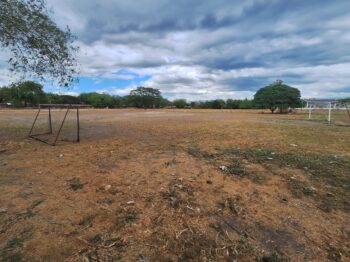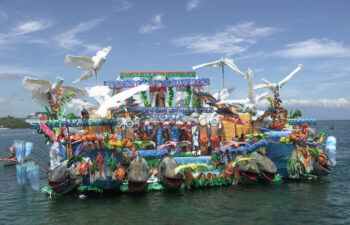 ZAMBOANGA CITY (MindaNews / 03 June) – The announcement on a “no movement” Sunday came as a shock – Fr Jun Mercado is gone. He succumbed to a heart attack. We knew he was admitted to the hospital, and there he tested positive for Covid. Though infrequently, he was still able to post on his Facebook accounts – His personal account is “Eliseo Mercado” (https://web.facebook.com/jun.mercado) where he posts personal views. He had a page too, “Bapa Jun Mercado” (https://web.facebook.com/frjunmercado/). In his personal account, he had 4,971 friends and 8,131 followers, while his page had 1,070 followers.
ZAMBOANGA CITY (MindaNews / 03 June) – The announcement on a “no movement” Sunday came as a shock – Fr Jun Mercado is gone. He succumbed to a heart attack. We knew he was admitted to the hospital, and there he tested positive for Covid. Though infrequently, he was still able to post on his Facebook accounts – His personal account is “Eliseo Mercado” (https://web.facebook.com/jun.mercado) where he posts personal views. He had a page too, “Bapa Jun Mercado” (https://web.facebook.com/frjunmercado/). In his personal account, he had 4,971 friends and 8,131 followers, while his page had 1,070 followers.
Further, we learned that on the day he had his heart attack, he was already Covid negative. We were dumbfounded by the news. This can’t be. There was initial denial. “Baka hindi totoo” (Might not be true). Some mixup in the news perhaps given the proliferation of fake news. Just as social media is filled with fake news, it can also be a source of reliable information, faster than the broadcast media if we know were to look for it. After reading a post from the OMI Facebook page announcing his demise, we begin to come to terms with the reality that indeed, Fr Jun, Pads, Bapa Jun, and a host of other endearments he is known for, is now gone and had moved on to the world beyond.
The OMI fathers, in general, hold a special place in the hearts of peoples and communities in the Cotabato valley and Sulu archipelago. For one, the American OMI fathers were pioneers in education, establishing school after school across these areas. There is a popular expression about them among the Sama population, “si father amuwan kende” (father gave candies). The candies and chocolates they handed out were often brought to these places from their homes in the United States after their regular vacation. It is this sense of generosity that endears them to the population. Aside from education, they also established hospitals, radio stations, newspapers, livelihood centers, etc.
It is from this breed of American OMI fathers that Fr Jun started his vocation as a priest. But his background will not be like theirs, his experience would be more local as he would grow up in Dulawan (now called Datu Piang) a multicultural, multireligious, and multilingual community on the banks of the Liguasan marsh. He was part of the ups and downs of the community. He would move around the OMI schools in Cotabato valley (which back then includes almost the entirety of what is now Region 12) and the Sulu Archipelago. He, like the late Bishop Ben de Jesus in Sulu, would create a niche in interfaith dialogue with diverse Moro communities united by their shared faith in Islam. He would live through the dark period of Martial Law, the beginning of the Moro secessionist movement and the violence that mark this tragic, bloody and painful regime among Mindanawons, and be a witness and lending his voice to oppose oppression and injustice.
Aside from his growing up years in Dulawan, he would also have an Islamic experience when he pursued his Islamic studies in Rome and immersed in an Islamic environment in the Holy Land. This immersion would open his world to the home of the religion that welds the 13 ethnolinguistic groups into one cohesive group the Spaniards would call Moros. Moros because they are reminiscent of those who were once present and ruled huge chunks of the Iberian Peninsula for about 800 years, twice longer than the Spanish presence in our country. This gained for Fr. Jun a deeper understanding of the Islamic faith beyond political and historical rhetorics. He would not only learn the religion, but he would visit religious sites and learn Arabic, the language of the Qur’an, and back here in the Philippines, Arabic is the preferred language among the Muslim religious professionals.
Perhaps it was in Cairo, Egypt, that he began to appreciate the Badaliya Movement started by Fr. Louis Massignon and his companions. Fr. Massignon was a Catholic scholar of Islam, a pioneer of Catholic-Muslim mutual understanding and in articulating the place for Islam and Muslims within the Catholic Church, paving the way for positive engagement and rapport with the Islamic world. Fr Massignon’s spirituality would be, singlehandedly, transported to Mindanao by Fr. Jun. While firmly rooted in the Catholic faith, Fr. Jun’s Badaliya movement would also be inspired by Islamic theology and practice. This is how Fr Jun was transformed and would become to be after his master’s studies.
Using two basic concepts in Massignon’s spirituality, Fr Jun would exemplify its sacred hospitality and mystical substitution. On one hand, sacred hospitality is about accepting and serving the other (i.e. the Moro/Muslim) without wanting to change or wishing the other to be the same as he is or to be different from what the other is already. This would underpin his advocacy for peaceful coexistence. On the other hand, the mystical substitution would influence the very Badaliya movement that Fr Jun organized when he returned from the Holy Land, offering his own self and prayer for the other. Not so much in order to convert, but so that God’s will may be fulfilled through them. In this persona, Fr. Jun is freeing himself from the confines of what divide religions, and move freely between Catholic and Islamic spirituality, and offering himself as the bridge and the articulator of one to the other and vice versa.
His Massignon’s spirituality would find even greater and wider expression when he became President of the Notre Dame University in Cotabato City. He would use his unique position as head of a premier institution to embrace a peace education framework that would see spirituality at the core of inner peace, and that inner peace would be a key foundation for all the other dimensions and expressions of peace, of peace not just in terms of the absence of violence, but the promotion of social justice. Massignon considers Gandhi a saint. Thus, it comes as no surprise that the Gandhian principles of non-violent actions would be integral learning in the peace education program that Fr Jun is leading through Notre Dame University. It was during this period that I would be among the thousand students enrolled in the peace education program.
I would hear, see and meet Fr. Jun in many diverse gatherings either in Cotabato, Davao, Zamboanga, or Manila. And when he speaks, people listen, not because of his office or authority, but because out of his passion and uncompromising commitment to righting the historical injustices, in shunning violence and keeping division at bay. He would lend his voice to the marginalized. He would raise his voice for what he feels is just and equitable. He would walk with all so that he may bring them together when they are ready to leave their prejudices and embrace each other’s humanity.
I had the chance to interact again with Fr Jun is when he accepted an initial invitation in 2017 by the Basilan governor and mayors in the Western side of the province. The governor and these mayors realized that if they can work together and succeed in owning and resolving their security problem, they can build on the same level of unity working together on the development front. Fr. Jun as senior policy adviser of the Institute for Autonomy and Governance (IAG) led what he refers to as a “listening tour”. He would be amazed at how the security situation had improved with an unscheduled tour around the island’s circumferential road. He was happy to see airconditioned vans plying the road network with ease and freedom. He was thrilled to see ordinary folks back to their normal lives, moving around going after their chores and livelihood. This listening tour would pave the way for an AECID-funded “Modelling Inter-LGU Support in Basilan (MILAB; read: “my love) Project supporting the envisioned alliance building and of working together under the Western Basilan Alliance (WBA).
The last face-to-face interaction I had with Fr. Jun was in Manila prior to the pandemic when IAG and UP Institute of Islamic Studies (IIS) partnered to undertake research on balik-Islam in the Philippines where he shared with the group some of his insights on Islamic conversion and conversion as seen through the ethnic and cultural lenses. We had completed that study in the latter part of 2020. Thereafter it was through Facebook that we continue to interact, read his posts and his positions on the current events at the international, national, regional, and local levels.
It is said that Massignon was influential in the formation of an Islamic view in the Vatican II’s Nostra Aetate and I think Fr. Jun breathed life into its letters by demonstrating a deep understanding of Islam and the Moro context here in the southern Philippines and approaching the Moros/Muslims not through the traditional lens of evangelization and conversion but through the prism of interreligious dialogue. With Fr Jun’s demise, we did not just lose a friend of the Muslim, we lost an advocate and a bridge-builder.
(MindaViews is the opinion section of MindaNews. Noor Saada is a Tausug of mixed ancestry – born in Jolo, Sulu, grew up in Tawi-tawi, studied in Zamboanga and worked in Davao, Makati and Cotabato. He is a development worker and peace advocate, former Assistant Regional Secretary of the Department of Education in the Autonomous Region in Muslim Mindanao, currently working as an independent consultant and is a member of an insider-mediation group that aims to promote intra-Moro dialogue.)







